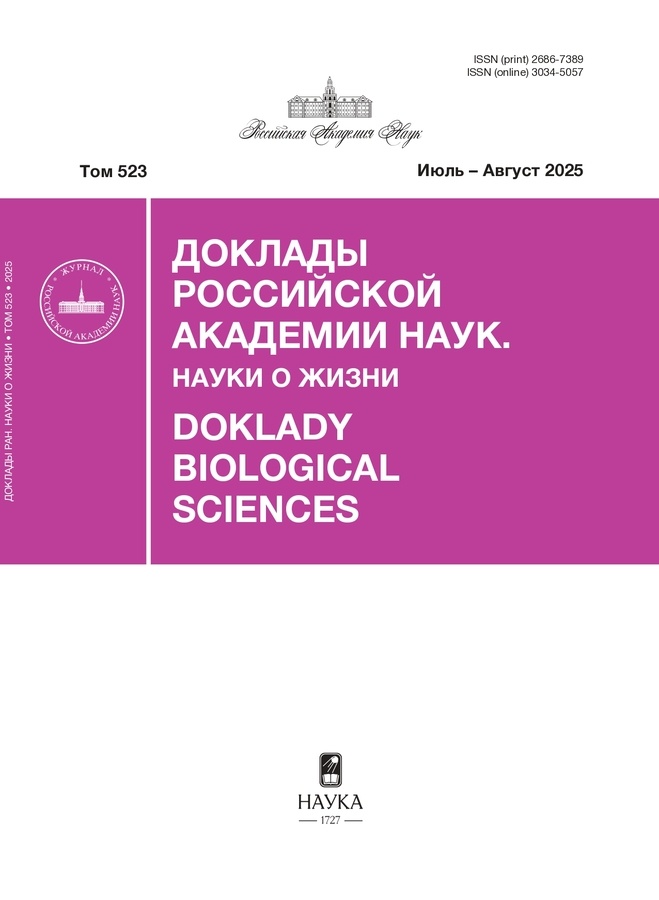Omega-3 docosahexaenoic acid as a promising inducer of ferroptosis: dynamics of action in prostate and colorectal cancer models
- Authors: Olkhovik D.M.1, Silkina M.O.1, Razumovskaya A.V.1, Klycheva K.V.1, Fatkulin A.A.1, Kulagin T.A.1, Nikulin S.V.1
-
Affiliations:
- HSE University
- Issue: Vol 520, No 1 (2025)
- Pages: 90-94
- Section: Articles
- URL: https://rjsvd.com/2686-7389/article/view/682048
- DOI: https://doi.org/10.31857/S2686738925010147
- EDN: https://elibrary.ru/tcicrw
- ID: 682048
Cite item
Abstract
Ferroptosis is an iron-dependent form of programmed cell death (PCD) associated with lipid membrane peroxidation. It has gained attention in cancer research because some tumor cells that are resistant to other forms of PCD are sensitive to ferroptosis. Despite the significant amount of research on ferroptosis, the list of known inducers remains limited, creating opportunities to discover new compounds with clinical potential. Recent studies have shown that long-chain polyunsaturated fatty acids, such as omega-3 docosahexaenoic acid (DHA), can act as ferroptosis inducers. This study examined the kinetics of ferroptosis in prostate and colorectal cancer cells under the influence of erastin and DHA. Differences in the kinetics and mechanisms of action were observed. Moreover, cells resistant to erastin were found to be sensitive to DHA, confirming the potential of further research into its use as an anti-cancer agent.
Full Text
About the authors
D. M. Olkhovik
HSE University
Email: snikulin@hse.ru
Russian Federation, Moscow
M. O. Silkina
HSE University
Email: snikulin@hse.ru
Russian Federation, Moscow
A. V. Razumovskaya
HSE University
Email: snikulin@hse.ru
Russian Federation, Moscow
K. V. Klycheva
HSE University
Email: snikulin@hse.ru
Russian Federation, Moscow
A. A. Fatkulin
HSE University
Email: snikulin@hse.ru
Russian Federation, Moscow
T. A. Kulagin
HSE University
Email: snikulin@hse.ru
Russian Federation, Moscow
S. V. Nikulin
HSE University
Author for correspondence.
Email: snikulin@hse.ru
Russian Federation, Moscow
References
- Dixon S.J., Lemberg K.M., Lamprecht M.R., et al. Ferroptosis: An Iron-Dependent Form of Nonapoptotic Cell Death // Cell. 2012. Vol. 149, N5. P. 1060–1072.
- Ozkan E. and Bakar-Ates F. Ferroptosis: A Trusted Ally in Combating Drug Resistance in Cancer // Current Medicinal Chemistry. 2022. Vol. 29, N1. P. 41–55.
- Hassannia B., Vandenabeele P., and Vanden Berghe T. Targeting Ferroptosis to Iron Out Cancer // Cancer Cell. 2019. Vol. 35, N6. P. 830–849.
- Qian H., Wanhui W., Daiqian W., et al. Blockade of GCH1/BH4 Axis Activates Ferritinophagy to Mitigate the Resistance of Colorectal Cancer to Erastin-Induced Ferroptosis // Frontiers in Cell and Developmental Biology. 2022. Vol. 6, N4. P. 229–239.
- Yang Y., Liu T., Hu C., et al. Ferroptosis inducer erastin downregulates androgen receptor and its splice variants in castration-resistant prostate cancer // Oncology Reports. 2021. Vol. 45, N4.
- Su Y., Zhao B., Zhou L., et al. Ferroptosis, a novel pharmacological mechanism of anti-cancer drugs // Cancer Letters. 2020. Vol. 483. P. 127–136.
- Nikulin S., Razumovskaya A., Poloznikov A., et al. ELOVL5 and IGFBP6 genes modulate sensitivity of breast cancer cells to ferroptosis // Frontiers in Molecular Biosciences. 2023. Vol. 10, P. 1–17.
- Lyamzaev K.G., Panteleeva A.A., Simonyan R.A., et al. Mitochondrial lipid peroxidation is responsible for ferroptosis // Cells. 2023. Vol. 12, N4. P. 611.
- Yang W.S., Kim K.J., Gaschler M.M., et al. Peroxidation of polyunsaturated fatty acids by lipoxygenases drives ferroptosis // Proceedings of the National Academy of Sciences. 2016. Vol. 113, N34. P. 4966–4975.
- Das M. and Das S. Identification of cytotoxic mediators and their putative role in the signaling pathways during docosahexaenoic acid (DHA)-induced apoptosis of cancer cells // Apoptosis. 2016. Vol. 21, N12. P. 1408–1421.
- Chen Z.Y. and Istfan N.W. Docosahexaenoic acid is a potent inducer of apoptosis in HT-29 colon cancer cells // Prostaglandins, Leukotrienes and Essential Fatty Acids. 2000. Vol. 63, N5. P. 301–308.
Supplementary files












